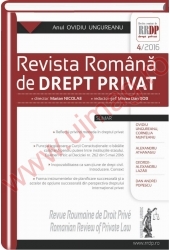Forma instrumentelor de planificare succesorală şi a actelor de opţiune succesorală din perspectiva dreptului internaţional privat
The form of succession planning instruments and the succession option instruments from the perspective of private international law
Author(s): Dan Andrei PopescuSubject(s): Law, Constitution, Jurisprudence
Published by: Universul Juridic
Summary/Abstract: We devised this study taking into consideration the stringent requirements of public notaries, who are increasingly facing the issue of the form of succession option declarations. Unfortunately, especially in the case of succession option declarations, we have found out an hesitating practice, the public notary having to deal with the foremost issue of checking the formal validity requirements of succession option declarations made in front of foreign authorities and conditioning them, for precautionary reasons, upon the authentic form of the instrument, in the meaning of article 3 (1) i) of EU Regulation 650/2012. On the other hand, other confrere notaries accept the use in succession proceedings the option declarations that were made even before Anglo-Saxon public notaries, regardless of provisions on lex successionis or provisions of the country of habitual residence of the person making such option. However, as we will see further on, there is no uniform regime as to the form of such declarations, neither those regulated by EU Regulation 650 nor those that relate to successions that are still governed by the Civil Code. The study also reviews the form of testaments in the context of article 27 of the European Regulation on Successions, including the issues connected to oral testaments, subject to national conflict of rules. If we were to contrast the formalism of succession planning instruments (article 27 of the Regulation) with the succession option instruments, we can easily spot a considerable restriction as to the liberty of forms in the latter case. When the law applicable to the succession is no longer a working hypothesis, but a lively and uncontestable reality, producing its effects upon the opening of the succession, its rigor can no longer be avoided. Albeit from a formal standpoint, some procedures and solemnities, with substantive effect (such as a property inventory), must be fully submitted to lex successionis. Besides, not only such solemnities must entirely belong to the competent inheritance law, but even the place of performance must be the same with the place where the succession is opened, before the competent authority that deals with it. It is also worth taking into consideration that the completion of succession proceedings usually require the presence of all the heirs and legatees. On the other hand, in order to avoid jeopardising the inheritance rights of those located in Member States other than the place of opening the succession, given the potential spread of heirs and the constraints that arise from the standpoint of overpassing the deadline set for indicating a succession option, “in order to simplify the life of heirs and legatees habitually resident in a Member State other than that in which the succession is being or will be dealt with” – consideration (32), article 13 of the Regulation tests a “middle way”, allowing for expressing succession options before a court of law or local authority, and article 28 allows by analogy compliance with local form requirements in terms of acceptance or waiver, when such options express simple indications of the will of heirs, legatees or other stakeholders (testamentary executors), that are expressly and timely made under the lex successionis. This is the first study dedicated to succession options instruments that were drafted from the standpoint of the private international law in our country. The study is designed with a twin approach in view: on one hand, a scientific approach, making use of all the significant contributions in the field published in Europe, and, on the other hand, a practical approach consisting of a wide range of solutions (including terms) for future notarial practice. We have taken out some references, especially to some articles and studies, to keep footnotes to a minimum – already quite large. The study focuses exhaustively on both the relevant provisions of European Regulation on Successions and on the applicable rules of conflict under our Civil Code – applicable in matters of succession opened before 17 August 2015. As far as the Civil Code provisions are concerned, we renounced to submit de lege ferenda proposals, as we consider that they are useless insofar as they are not applicable to successions opened after the date of entry into force of the European Regulation, and, on the other hand, with regard to successions opened before that date, such amendments would be anyway unenforceable on the basis of the principle of non-retroactivity.
Journal: Revista Română de Drept Privat
- Issue Year: 2016
- Issue No: 04
- Page Range: 145-187
- Page Count: 43
- Language: Romanian
- Content File-PDF

